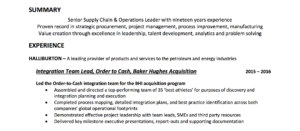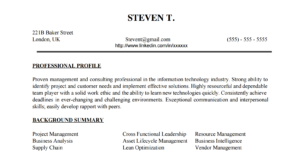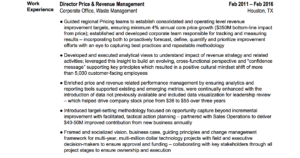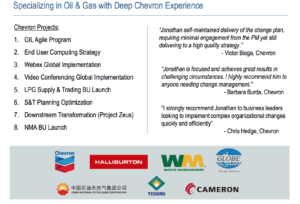What We’ll Cover In This Piece:
- Why a resume is a foundational piece of building trust as a consultant.
- Mistakes the vast majority of consultants and contractors get wrong with their resumes.
- A step-by-step process for creating the perfect consulting resume.
Estimated Time to Read: 8 minutes
As a consultant, your business comes down to two things: your relationships, and your resume. This article is about how to create a great resume.
Recruiters and clients might find you using their internal systems, on BenchWatch, through your website, or on LinkedIn, but until they get you on the phone or meet you in person, your resume is how they are going to judge you.
In fact, if your resume is wrong, they will never talk to you at all.
You have to understand, by the time you speak to a recruiter or client, 90% of the hiring process is already over. There have been conversations about what this role looks like, what kind of consultant they need, what the budget looks like, and which candidates look the most promising.
Because you can’t be there in person for those conversations, you need a resume that speaks for you, and puts you in that conversation so they DO reach out to you.
The biggest mistake we see consultants make with their resumes is simple: they have resumes with a lot of words, that don’t say the right things.
Think of it this way: If you were called in for an interview with a client, would you open the conversation by bragging about where you went to school? Or would you talk about people you knew in common?
Do you think a client would ask you questions about an award you won that has nothing to do with the job, or about a project you executed that was similar to the one they’re interviewing you for?
Clients and recruiters only want to know that you can execute in the role you’re being hired for.
They want to trust your ability to get their specific job done.
A good resume creates that trust by showing them you have the skills and experience to succeed, not by flashing your academic pedigree or focusing on other things they don’t care about.
What Does A Good Consultant Resume Look Like?
There is a strict formula for crafting a good consulting resume. As you’ll see in the examples below, the formula can be adapted to your personal style, but the basic format remains the same:
- At the top of your resume, 2-3 short sentences to define who you are—your industry, your broad experience, and your niche. You want to use words like “Trusted” and “Proven” to signal reliability and quality.
- Underneath your introduction, list your top 3-5 skills and specializations. Make sure those skills are relevant to the job you’re applying for. If the client is looking to do a company-wide implementation of Oracle, don’t boast about your Salesforce knowledge.
- Beneath your top skills, list your relevant experience. Detail projects you worked on that are relevant to the role you’re applying for, and go in depth about what you did on those projects and the skills you developed.
- Below your experience, list testimonials and press coverage. If you can, list testimonials from people either in your prospective client’s field, or people you know they’d respect. Similarly, if you have so much press coverage that you must be selective, pick relevant or high status press.
- Finally, talk about your education. At this point, the client or recruiter has already made their mind up, so don’t overemphasize your education (as so many people do). Keep it brief and to the point.
Let’s look at some real world examples of resumes that follow this format.
1. The Perfect Opening Is Simple
A good opening summarizes your talent, focus, and experience neatly, while signaling that you are a consultant that can be trusted to deliver:
He gets straight to the point, and in three simple sentences lays out who he is, what he’s good at, and what he’ll bring to your company. He then immediately dives into his work experience, laying everything out in terms of the skills required to execute. His work experience goes on in this fashion for two full pages.
To see his full resume, click here.
2. Only Your Most Relevant Skills Matter
The greatest advice I ever received as a consultant came from a prospective client who didn’t hire me.
I was young at the time, had just started my consulting company, and was trying to close a massive client. While meeting with their executive team, I ran through everything they could possibly want. I basically told them that if they wanted it, my firm could do it.
On the way out, one of their executives (a friend of mine to this day) pulled me aside and told me they weren’t going to go with me, and here was why:
I told them I could do everything, but they weren’t looking to hire someone who could do everything. They wanted the consultant who was the absolute best at the one specific thing they needed.
I see consultants make this mistake all the time. Instead of listing their 3-5 most important skills, they list everything they can do:
This is an otherwise perfect resume. The introduction is solid, the rest of the resume (which you can see here) goes into perfect detail. The problem is that he lists more skills than a client could possibly be interested in.
3. Experience Is Everything
The experience you list on your resume has to be relevant to the job you want, and it has to tell employers what they need to know, namely:
- What roles you’ve held in the past.
- What skills you applied to those roles.
- Who you worked with in those roles.
- What you delivered for those companies.
Here’s an amazing example of this:
That’s just one job this person has held, and they’ve mined it for all of that information. Each bullet point lists the project they worked on, the role they held on that project, the skills they developed, the people they worked with, and what they delivered.
Listing one relevant job with that level of detail and value is much more compelling to a hirer than listing 20 irrelevant jobs with quick summaries.
To see the full resume, click here.
4. Testimonials Should Come From Relevant Professionals
Anytime you can get a past client or employer to write a testimonial for you, you’re in a good spot. Ideally, however, you have enough testimonials that you can tailor your resume to the particular job you’re pursuing.
Even better, if you’re applying to a company you’ve worked with a company before, you should try to get testimonials from people within their organization.
For example, here’s an excerpt from my resume tailored to Chevron:
All of my testimonials come directly from within the Chevron corporation. On top of that, all of my work experience is on Chevron projects.
5. Your Degree Is The Least Important Detail
Once a hirer makes it through all of this information, they have a pretty good idea of who you are. They know what you can do for them, what you’ve done for others, and they have some examples of clients who were willing to go on the record and give you a testimonial.
The education section of your resume is a “nice to have.” A hirer checks it to see if there’s anything incredible (like if you have a Harvard MBA or an amazing list of awards), and that’s about it. They already know if you have the necessary skills based on the previous sections of your resume.
Because of this, your education section should be the shortest part of your resume. For example, this is what mine looks like:
It’s by far the smallest section of the whole resume, and 80% of it is dedicated to awards I’ve won for actually doing business, not my degree.
Think of it this way: do you think an oil company looking to hire a contractor cares more about an award from executives at Chevron, or a passing grade from a business professor who has never been in the oil business?
The Pro Trick: Multiple Resumes
Using the example resumes you’ve been given, you should be able to create a killer resume tailored to getting a specific job in your niche. That’s the first step.
However, no matter how particular your area of focus is, there is never going to be only one job you’re a fit for. For example, I’m an expert in the oil and natural gas industry, and I’ve spent a lot of time working with Chevron.
In fact, as you saw above, I have an entire resume that is tailored to Chevron, listing my experience with Chevron projects and featuring testimonials exclusively from Chevron employees.
But as the managing partner at LightRock Consulting, my team and I service a variety of companies outside of Chevron:
Executives at Spectra Energy aren’t going to hire me because I have the perfect resume for Chevron. Similarly, my experience with a particular software suite is irrelevant to a company with a different IT infrastructure.
I have multiple resumes, each tailored to different industries, project types, and in some cases, specific companies to make sure that I am the ideal candidate for each contract.
This has been one of the greatest tricks I’ve learned in my career. Your resume needs to say you’re great specifically at the job your client is hiring for, not that you’re generally good a lot of different things.
Having multiple resumes, each of which are perfect to a different category of client, lets you fish with a wide net without sacrificing that specificity.
If you’re an experienced consultant, go back and look at all of your past projects. Group them by industry, project type, and your most frequently contracted clients. Ask yourself what would each group want to see most in a resume, and use that information to create a perfect resume for each.
If you’re a newer consultant, do the same exercise, except instead of thinking of the clients you’ve previously worked with, imagine the clients you’d like to service.
Why Multiple Resumes? No One Hires You To Do 1,000 Things
I’ve written about this before, but one of the problems with hiring in the internet age is that many think of it as a numbers game—when really, it’s a matter of trust.
What the internet has done is made it extremely easy for recruiters to find 1,000 potential candidates for a role. As a result, consultants have created very general resumes and profiles that qualify them for as many positions as possible.
The issue is that being qualified for a role isn’t the same thing as being perfect for a role.
No hirer really wants 1,000 candidates who are qualified for a role. They want the one candidate who is perfect for the role—everyone else is useless to them (This need was a huge part of the initial motivation to build BenchWatch).
When you make your resume so general that it qualifies for 1,000 jobs, you are guaranteeing that it is not perfect for any job.
That’s why it’s so critical that you create a different resume for each specific job in your niche. You want to make sure that when a client sees your resume, there is no doubt in their mind that they can trust you to deliver the one thing they need—whatever that thing may be.






